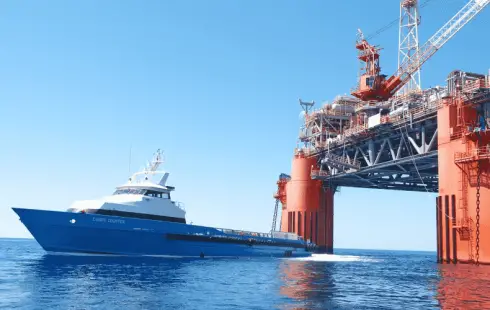
Ukrainian Diplomat Calls for Stronger Security Commitments Beyond NATO-Style Guarantees
Section: Politics
 In a significant move more than two years following the onset of the Ukraine conflict, the European Union (EU) is set to implement punitive measures targeting the Russian gas sector, a crucial revenue stream for Moscow. Diplomatic sources reveal that the EU Commission is presently in talks with member states to finalize the 14th sanctions package, which could impact the imports of Russian liquefied natural gas (LNG).
In a significant move more than two years following the onset of the Ukraine conflict, the European Union (EU) is set to implement punitive measures targeting the Russian gas sector, a crucial revenue stream for Moscow. Diplomatic sources reveal that the EU Commission is presently in talks with member states to finalize the 14th sanctions package, which could impact the imports of Russian liquefied natural gas (LNG).
Previous rounds of sanctions had contemplated banning or restricting Russian LNG imports, yet such proposals were consistently thwarted by objections from certain member states. However, discussions surrounding the 14th sanctions package appear more promising this time around, with expectations that measures concerning LNG will be included, according to sources in Brussels.
While some nations, like Sweden and Germany, have expressed support for sanctions on Russian LNG, others such as Spain and Belgium, whose ports serve as entry points for tankers carrying Russian liquid gas, have signaled readiness to back restrictions. France, another destination for Russian LNG shipments, remains undecided, although President Emmanuel Macron has notably adopted a firmer stance towards Russia in recent weeks.
Over the past two years, the EU has imposed sanctions on Russian oil and coal exports, yet measures targeting the import of Russian natural gas have not been enforced by the EU, despite Moscow's voluntary reduction in gas deliveries. For instance, following the onset of the conflict, Russia ceased gas shipments to Germany via the Nord Stream pipeline. As per the Center for Research on Energy and Clean Air (CREA) in Finland, Russian natural gas's share in EU imports declined from 46 percent in 2021 to 16 percent in 2023.
While pipeline deliveries of Russian gas to the EU waned, Russia's LNG exports to Europe surged by 36 percent in 2022, creating a peculiar scenario where Russia became the EU's second-largest supplier of LNG after the USA, even as European nations allocated significant funds to bolster the Ukrainian defense against Russian aggression. In 2023, Russian LNG sales to Europe amounted to over eight billion euros, roughly equivalent to Germany's planned military aid for Ukraine this year, as per CREA's estimations.
Despite these developments, diplomats anticipate that the EU will not enforce a blanket ban on Russian LNG imports, given its current contribution of five percent to the EU's total gas consumption. Such a drastic measure could potentially escalate gas prices in Europe, impacting citizens' cost of living. Several EU member states, such as Austria, still rely on Russian gas.
Instead, the EU Commission is reportedly considering sanctions targeting specific LNG projects in Russia, including new production facilities and loading terminals. Particularly, the Commission aims to prohibit the transshipment and re-export of Russian LNG in European ports. A significant portion of Russian liquid gas is not integrated into the EU gas network but is rather rerouted through ports in Belgium, Spain, and France for onward transportation to destinations like China and India. Consequently, European ports serve as conduits for Moscow's gas exports to Asia, indirectly funding the conflict in Ukraine. Proposals outlining Brussels' strategy to address this issue are anticipated in the coming days.
Image by Gabe Raggio from Pixabay

Section: Politics

Section: News

Section: News

Section: News

Section: Arts

Section: News

Section: News

Section: News

Section: News

Section: News
Both private Health Insurance in Germany and public insurance, is often complicated to navigate, not to mention expensive. As an expat, you are required to navigate this landscape within weeks of arriving, so check our FAQ on PKV. For our guide on resources and access to agents who can give you a competitive quote, try our PKV Cost comparison tool.
Germany is famous for its medical expertise and extensive number of hospitals and clinics. See this comprehensive directory of hospitals and clinics across the country, complete with links to their websites, addresses, contact info, and specializations/services.
Join us at the Kunstraum in der Au for the exhibition titled ,,Ereignis: Erzählung" by Christoph Scheuerecker, focusing on the captivating world of bees. This exhibition invites visitors to explore the intricate relationship between bees and their environment through various artistic expressions,...



No comments yet. Be the first to comment!